Student Blog
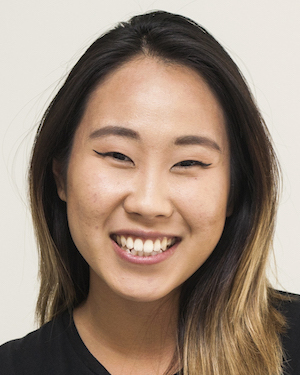
Fieldwork Meltdown ⟩
October 18, 2018, by Joyce
What is fieldwork anyways?
If you’ve talked to OTs or OTS you’ve probably heard this term thrown around. Overall, fieldwork is an out-of-classroom experience to practice your clinical reasoning and therapeutic skills under the appropriate supervision. The reason why I say “appropriate supervision” is because they may not always be an occupational therapist.
WHAT? HOW? WHY? OMG HOW WILL I BE AN OT?
I know, I had the same thoughts running through my head. To break it down, fieldwork experiences can be categorized into two levels, Level 1 and Level 2. To be clear, for your level 2 fieldwork, you must be under the supervision of a registered and licensed occupational therapist. However, for your level 1 fieldwork, your supervisor can vary. From my own personal experience, my first “CI” (clinical instructor as we call them in the OT world . . . not white collar criminal informant) was a life skills coach at ICAN California Abilities Network, a day program for adults with intellectual disabilities. In addition, a few of my peers worked under the supervision of a physical therapist, a certified occupational therapy assistant, or even a psychologist.
While your head might be spinning and your anxiety shooting through the roof, I learned that it’s okay. For your level 1 fieldwork, the objective is to gain an understanding of the needs of the clients. While each experience varies, most students use this time to observe and discuss with their CI the needs of the clients that they encounter and what treatment plans could look like. You never know what you can learn if you keep an open mind.
For example, this last week was my full week of Level 1 fieldwork, meaning instead of going to class, I was going to my fieldwork site, Children’s Hospital of Los Angeles USC University Center of Excellence for Developmental Disabilities (CHLA UCEDD). I experienced such an enriched week of learning that varied from observing to actively participating in treatment sessions. What prepared me for this fieldwork site was my first fieldwork at ICAN working with the life skills coach. I observed the ways they worked with the clients who had Autism, Down Syndrome, or Cerebral Palsy. Even though they weren’t occupational therapists, I took that time to really engage in conversations with the clients to get a tiny glimpse of what their life and daily routine was like. This built a strong foundation of communication and interpersonal skills that translated over to my fieldwork here at CHLA UCEDD. And because my clients at ICAN were 22+, I was able to see what life can be like for the children I see at my current fieldwork. This allowed me to start that clinical reasoning as to what skills should the individual be working on throughout their childhood and adolescence in order to be as independent as possible in their emerging adulthood years.
It took me a while to understand the meaningful lessons I gained from ICAN. Honestly, I was just really bitter about the fact that I wasn’t placed at a setting with an occupational therapist. However, upon reflection, have I continued to resent my placement and closed the door on many of the wonderful conversations that took place, I wouldn’t have had that knowledge to reflect back on when interacting with clients today.
⋯
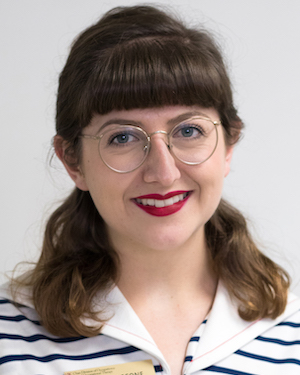
Why I’m Doing the OTD ⟩
October 18, 2018, by Antonietta
I decided to pursue the OTD at USC because I love our profession and I want to give back to it. I see the OTD as a way to grow and blossom as a leader. It is a guided experience to gain clinical expertise, discuss current issues in occupational therapy on both a micro and macro level, and develop professional skills. I know the area of practice that I am interested in and the bigger picture problems I want to fully grasp and then help crack open. The OTD process will help me accomplish these goals.
After completing the coursework for a sensory integration certificate during my Masters, I realized that I wanted mentorship from leaders in SI as I take these concepts from the classroom into practice. This lead me to do half of my residency at Therapy West. I think I could build these clinical skills as an entry level practitioner; the OTD is both a tool and an experience that will let me go a step further. I want to take SI out of the clinical gym into a community based setting. I am developing such a program as the second half of my residency, at The Children’s Ranch, where additionally we incorporate animals into our sessions. I want as much support as possible as I try develop this unique area of clinical practice, which I get from both preceptors at my residency sites and my faculty mentor at USC.
Finally, I’m doing the OTD because I am interested in being a professor of Occupational Therapy. I am building my skills at collecting and collating information as well as presenting it. I’m excited about this upcoming year and look forward to sharing my experience with you. Fight On!
⋯
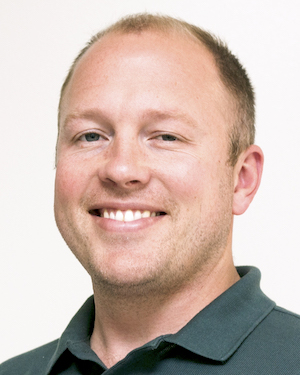
OTAC Conference Around the Corner ⟩
October 17, 2018, by Evan
Every year, the Occupational Therapy Association of California holds a state-wide conference. This year the conference will be held Oct 25-28 just down the street from us in Pasadena, CA. OTAC Conference is one of the highlights of my year, not just because I’m the OTAC liaison for my 2019 graduating class, but because I truly believe in the mission of OTAC and am proud of how the organization serves our profession.
OTAC is a membership organization, meaning that the bulk of the operating budget is directly gathered from current professional and student memberships. Here at USC, the student body elected to require all currently registered students maintain active memberships, and I am so proud that we do so. The money raised across the state fosters a wide variety of leadership and professional development initiatives, but most importantly it is utilized for legislative advocacy efforts. AB221 (Update of the Occupational Therapy Practice Act), which was signed into law by Governor Brown several weeks ago, is a recent success story of these dollars at work. I encourage you to learn more about the OT Practice Act and how it has been amended to reflect the modern-day needs of patients and the current services offered by occupational therapists and occupational therapy assistants. These are the important issues of our day.
So, for those of you considering a career in Occupational Therapy, I cordially invite you to conference to learn more about our profession. For those of you who are currently students, I invite you to conference to learn about ways in which to become a more competent practitioner, advocate, and future leader in the field. And for those of you who are already licensed professionals, I encourage you to come to conference with an open mind (there’s always something new to learn), pass on your considerable knowledge to future practitioners, and keep your OTAC membership current!
The stakes are high. I don’t believe it’s an overstatement to suggest that the future of our profession will be shaped by how directly students and professionals continue to engage with our state and national professional organizations.
⋯
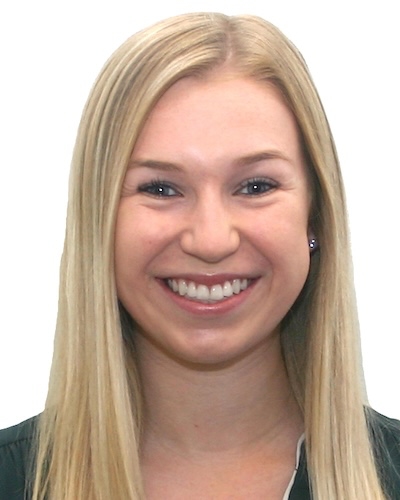
OT’s Role in Lymphedema ⟩
October 16, 2018, by Jessica P.
The semester is officially in full-swing and students here at USC Chan are immersing themselves in their Level I Fieldwork experiences. As part of our Level I Fieldwork, about halfway through the semester we have classes cancelled for the entire week and we get the opportunity to go to our fieldwork site for the whole week. This allows us to really see what it is like to be an OT in this practice setting. Last week, us second years had our full week and are now back on campus prepping for the second half of our semester.
As part of my adult physical rehabilitation practice immersion, my fieldwork this semester is at an outpatient oncology and lymphedema clinic at Providence Holy Cross Medical Center. If you are anything like me, you may be unfamiliar with what OT’s role in lymphedema is. My clinical instructor is a Certified Lymphedema Therapist (CLT), which is considered an advanced practice area within OT.
But wait . . . what even is lymphedema? When lymphedema occurs in oncology patients, it is called secondary lymphedema. This is when the lymph vessels aren’t able to adequately drain lymph fluid, usually from an arm or leg. Most of the patients that I see are breast cancer survivors who experience lymphedema of the arm or trunk. As part of their OT treatment, they come in for manual lymph drainage, which is a gentle massage guiding the lymph fluid towards areas where there are still good lymph nodes in the body.
OTs also have a critical role in educating and training patients on lifelong management of this chronic condition. It is complex and multi-faceted so OTs may utilize all different interventions such as kinesiotaping, low-level laser therapy, scar mobilization, cupping, and so much more.
One of the biggest things I learned throughout my full fieldwork week was how OTs really play a role in enabling a patient to advocate for themselves. Many of our patients come to us after years of experiencing lymphedema. They haven’t received the treatment they need and have given up. We have the important role of being able to give them hope again, while utilizing an evidence-based practice and allowing them to engage in their meaningful occupations again!
⋯
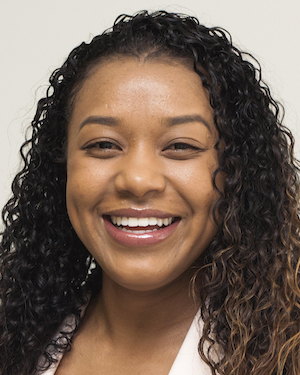
USC, CSUDH, and Loma Linda University at the 16th Annual Tea with a Scholar ⟩
October 15, 2018, by Serena
At the 16th Annual Afternoon Tea with a Scholar, I received tips from self-care to ways to receive financial aid as a student and practicing OT. The event was very informative and a wonderful way to bring occupational therapists together. Previous student ambassadors have written about their experiences with past Tea with a Scholar events, which have featured Dr. Florence Clark and Dr. Ann McDonald.
So you may ask, “What is Afternoon Tea with a Scholar?” It is an annual event put on by occupational therapists. The intention is to bring the profession together to discuss current research in the field of Occupational Science. To set the scene a bit, there were students, faculty, and staff members from USC, Cal State Dominguez Hills (CSUDH), and Loma Linda University (LLU). Additionally, board members from occupational therapy organizations like the California Foundation of Occupational Therapy (CFOT) and the Occupational Therapy Association of California (OTAC) were present. So as you can probably tell it was a great way to get more connected with the larger OT community.
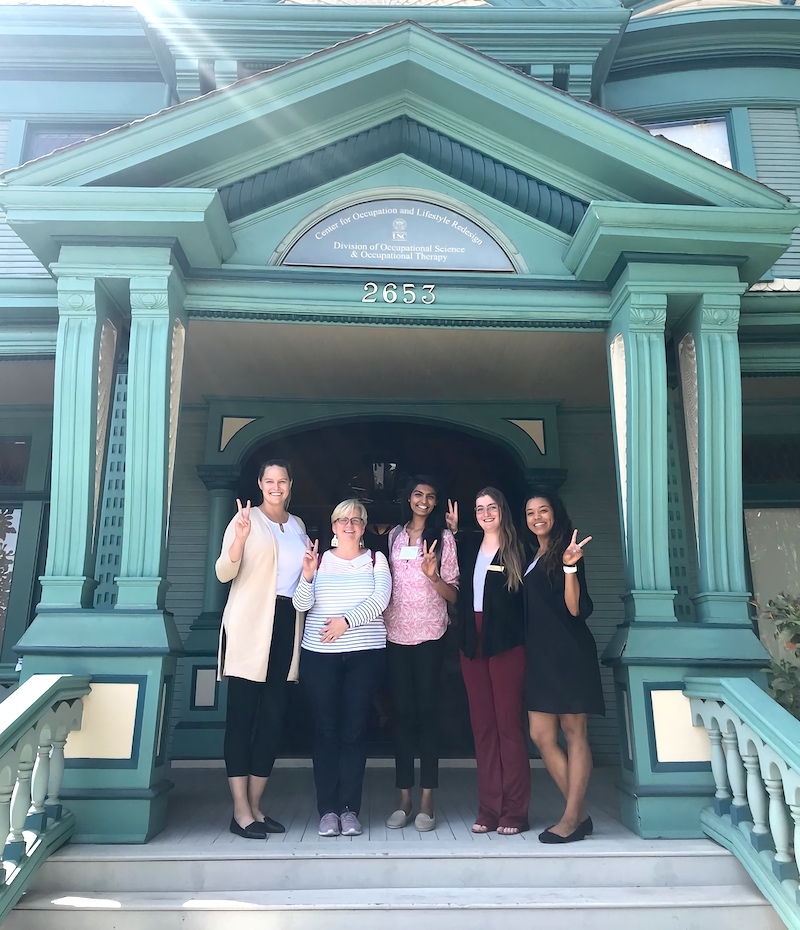
My colleagues and me at the 16th Annual Afternoon Tea with a Scholar proudly holding the Trojan sign in front of USC’s Center for Occupation and Lifestyle Redesign.
The event was held at USC’s historical Center for Occupation and Lifestyle Redesign. The topic of the afternoon was Community Health and Wellness. Dr. Julie Kugel was the honorable guest lecturer and is the director of the Occupational Therapy Doctorate (OTD) program at LLU. She presented on the current research she was engaged in and shared some of the impactful experiences that have shaped the scholar she is today. She addressed the concept of doubt and kindly stated that “Doubt does not make us any less, it makes us human.” The ability to select so many different paths in the field of occupational therapy at times creates doubt, at least for me (lol). However, with this new understanding, I find doubt to now be humanizing and a common life experience. Another concept that Dr. Julie Kugel spoke about was what it means to be a true scholar. A true scholar is a person who is able to engage in conversation and advocate for our profession. I find this skill to be crucial in our ability to expand in areas where OTs are not currently practicing but are so desperately needed in helping to promote overall health. Additionally, the benefits of volunteering at conferences was also touched upon since this allows you to understand and learn about what goes on behind the scenes. Plus, you can possibly receive a conference ticket discount by volunteering a couple of hours of your time. While volunteering, you never know who you may meet and what those connections may lead to in the vast world of occupational therapy.
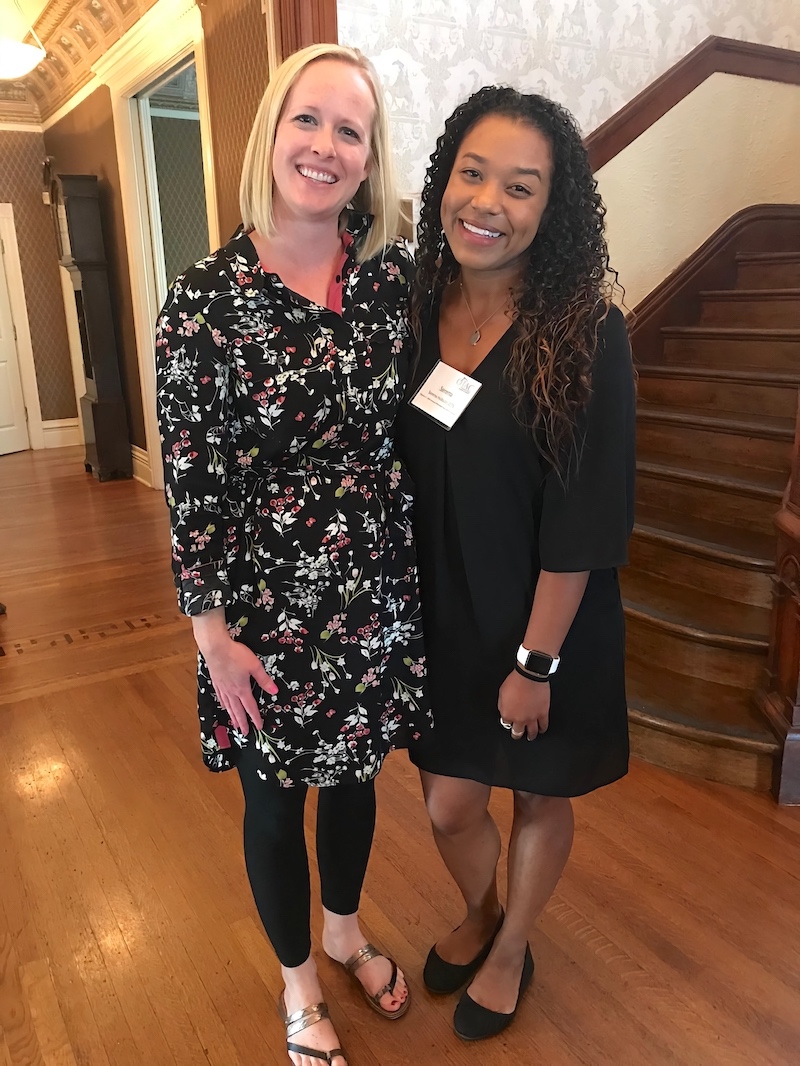
Dr. Julie Kugel after her lecture on Community Health and Wellness.
⋯





